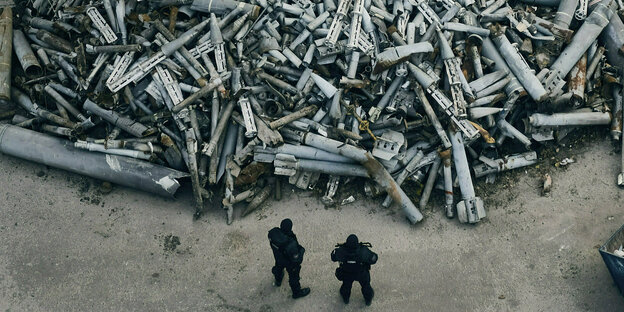Without Chinese “dual-use” products, Putin's war machine would not function as it does. This is also what a visit to China should be about.

Remains collected from Russian missiles in Kharkiv Photo: libkos/ap
BEIJING taz | The gray walls of the Russian embassy in Beijing, after all one of the largest diplomatic missions in the world, are adorned these days with particularly perfidious images. Next to photographs of Soviet soldiers from World War II with Russian special forces in Ukraine. “We won then and we will win now,” she says in Cyrillic letters. And in Chinese characters: “Victory is ours.”
To what extent Xi Jinping supports his “old friend” Vladimir Putin in his imperialist ambitions is one of the central questions for many heads of state in Europe. However, it will not be discussed publicly on Thursday: that will be when Putin arrives in the Chinese capital. This is his first trip abroad after beginning his fifth term as Russian president.
The exact program of the summit is kept secret. Less than 48 hours before its scheduled start, the Chinese Foreign Ministry even confirmed the meeting between Putin and Xi. But it is certain that the Beijing party leadership will roll out the red carpet to welcome Moscow's distinguished guest. It cannot be ruled out that critical issues will be debated. But any discrepancies will not be communicated to the outside world.
There would be much to discuss. The accusations of the political West are on the table. While Olaf Scholz opted for friendly rhetoric during his recent visit to Beijing, US Secretary of State Antony Blinken recently spoke clearly: “If China claims to want good relations with Europe and other countries, it must not also be the biggest threat to European security since then. Promoting the end of the Cold War.”
Key role of Chinese exports in Russia's war
The fact is that bilateral trade between the two countries has boomed since Putin sent his tanks towards kyiv in February 2022. While China buys cheap oil from Russia, its exports have also increased by around 60 percent.
But the accusations from the United States and the EU go beyond mere business: the criticism is that China supplies Russia with so-called “dual-use” goods on a large scale. These are products that can be used for both civil and military purposes: drone engines, for example, optical sensors, machine tools or chemicals to produce rocket fuel.
Researcher Nathaniel Sher of the Washington Carnegie Endowment for International Peace recently assessed China's public customs data across the board. His study reaches a sobering conclusion: of the around 50 products that the West classifies as “high priority” because of their dangerousness, Russia bought almost 90 percent from China, either as re-export or produced directly in the People's Republic. . In 2021, the proportion was around 30 percent.
“Consequently, Chinese exports have played a key role in sustaining Moscow's war effort,” writes expert Sher: “Supplying Russia with dual-use goods rather than finished weapons has allowed China to support Russia and at the same time plausibly denying it.” says the study.
At least one possible positive trend can be derived from the data evaluated. While the value of these “high-priority dual-use goods” was around $600 million in December, it is currently only half that.
More recently, in Paris, Xi Jinping promised French President Emmanuel Macron to “strictly control” the export of “dual-use” goods to Russia. But the European Union would do well to judge the 70-year-old Chinese leader by his actions and not take his words at face value.
